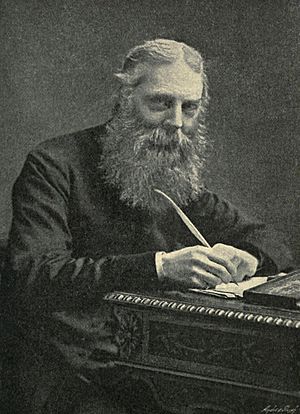Walter William Skeat facts for kids
Walter William Skeat (born November 21, 1835, died October 6, 1912) was a very important British philologist. A philologist is someone who studies language, especially its history and how words change over time. Skeat was key in making the English language a major subject to study at universities in the United Kingdom.
Contents
His Life Story
Walter Skeat was born in London. His father, William Skeat, was an architect. Walter went to King's College School and Highgate School. Later, he studied at Christ's College, Cambridge University. In 1860, he became a fellow at Christ's College. This means he was a senior member of the college.
In 1860, Skeat became an Anglican deacon, which is a type of church minister. He also married Bertha Clara. For a few years, he worked as a curate (a church assistant) in different towns. In 1864, he returned to Cambridge University. He taught mathematics there until 1871.
Soon, Skeat became very interested in the history of the English language. He started working on an edition of the famous writer Geoffrey Chaucer's works. Chaucer wrote in Middle English, an older form of English. In 1894, Skeat published a huge six-volume collection of Chaucer's writings. He added another book about Chaucer in 1897.
In 1878, Skeat became a professor at Cambridge University. He studied Old English (also called Anglo-Saxon) and the Gothic language, which are very old languages. But he is most famous for his work on Middle English. He created important versions of Chaucer's works and Piers Plowman by William Langland.
Skeat also started the English Dialect Society in 1873. He was its only president. The society's goal was to gather information for The English Dialect Dictionary. This dictionary collected words and phrases used in different parts of England. The society closed in 1897.
Walter Skeat is buried in Cambridge. His wife, Bertha Clara, and their daughter, Bertha Marian Skeat, are buried with him. Bertha Marian was a writer and a headmistress. His son, Walter William Skeat, became an anthropologist (someone who studies human societies and cultures). His grandsons included T. C. Skeat, who studied old handwriting, and Francis Skeat, a stained glass artist.
His Important Work
Understanding Words and Names
One of Skeat's biggest achievements was his book, An Etymological Dictionary of the English Language. This dictionary explained the etymology of words. Etymology is the study of where words come from and how their meanings have changed over time. While working on it, he wrote many short articles about word origins for a journal called Notes and Queries.
Skeat also came up with the term "ghost word". A ghost word is a word that appears in a dictionary or text but doesn't actually exist or is a mistake. He was an expert on these words. Skeat was also one of the first to study place-names. This is the study of how towns, rivers, and other places got their names. Some of his books on place-names include:
- Place-names of Huntingdonshire (1902)
- Place-names of Hertfordshire (1904)
- Place-names of Bedfordshire (1906)
- Place-names of Berkshire (1911)
- Place-names of Suffolk (1913)
Editing Old Books
Skeat edited many important old texts, making them easier for people to read and study. Some of his famous editions include:
- The Holy Gospels in Anglo-Saxon, Northumbrian, and Old Mercian Versions (1871)
- Chaucer's A Treatise on the Astrolabe (1872)
- Piers Plowman (1886)
- The Complete Works of Geoffrey Chaucer (1894–97)
He also edited works for special groups like the Early English Text Society and the Scottish Text Society. These included:
- Bruce by John Barbour
- Pierce the Ploughman's Crede
- Havelok the Dane
- William of Palerne
- The Kingis Quair
Skeat also created the main edition of Ælfric of Eynsham's Lives of the Saints. This book included translations, many of which were done by two women, Mss Gunning and Wilkinson.
Sharing Knowledge
Walter Skeat was known for his interesting lectures. Even though he wasn't a "traditional" teacher who followed strict lesson plans, students loved his talks. He would share many fascinating facts and stories from his vast knowledge.
He also wrote books to help people learn about English language history:
- Specimens of English from 1394 to 1597 (1871)
- Specimens of Early English from 1298 to 1393 (1872), written with Richard Morris
- Principles of English Etymology (two parts, 1887 and 1891)
- A Primer of Classical and English Philology (1905)
English Scholars and English Texts
Skeat was one of the few English language experts in England who could compete with the well-funded scholars from German universities.
Like another scholar named Henry Sweet, Skeat felt that writers like Geoffrey Chaucer were part of England's national history. He didn't like it when German scholars published works about them. Skeat once said that even though he was "merely a native of London, in which city Chaucer himself was born," he should still be able to study Chaucer without feeling like German scholars were taking over.
 | Shirley Ann Jackson |
 | Garett Morgan |
 | J. Ernest Wilkins Jr. |
 | Elijah McCoy |


